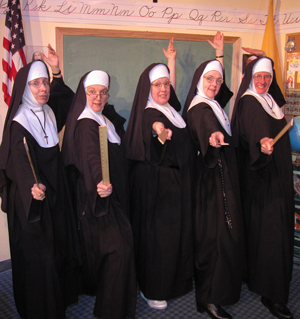
An advertisement once proclaimed "You don't have to be Jewish to love Lender's bagels"—nor, apparently, do you have to be Catholic to attend Late Nite Catechism, authored by Vicki Quade and Maripat Donovan, premiering in 1993 and running continuously to the present day. With a scenario premised on a class offering adults instruction in the tenets of Catholicism, conducted by a nun in full pre-Vatican II garb, this one-woman show has consistently attracted audiences of all ages, environments, ethnicities and creeds.
"People will bring their non-Catholic companions to show them what it was like growing up Catholic," explains Liz Cloud, one of several actresses who have essayed the difficult role of the teacher (known to her "students" only as "Sister"), along with Mary Zentmyer, who adds, "I once gave a performance at a Methodist church in Tulsa, Oklahoma. Three hundred and fifty Southern Protestants, and they loved it!"
Other audiences have been less friendly. Lisa Buscani recalls facing a group at a charity fundraiser in Detroit that didn't understand the nature of the evening's entertainment. "They were walking around the room and heckling me, like they were in a bar! The script has parts where you can improvise, but if you keep stopping, you'll never finish the play. After they started throwing wet napkins at me— cloth napkins, soaked in the water glasses! — I rushed through to the end and got out."
Then there are the pranksters, ranging from the playful — several Sisters report flash-mob showers of paper airplanes following the class break — to the outright bizarre. Lisa Braatz remembers a performance at, ironically, a convention of priests and monks. "I picked an audience member to be 'class monitor' while I was gone, and when I returned, he was bound and gagged with duct tape and had a little statue of Mary stuck on top of his head."
"What we look for in auditions are extensive improv skills, obviously," confides author-producer Vicki Quade, "and being of appropriate age to have taught school in the 1960s. Having been Catholic is important, too, if an actress is going to be believable as a nun. We don't want her stumped by a question that might be pretty basic to the religion."
The repertoire of western drama encompasses singing nuns, dancing nuns, mentally disturbed nuns, angry nuns and scheming nuns, but it's the personality of the guide whom one playgoer called "every nun I ever knew, but all rolled up into one" that has ensured the longevity of Late Nite Catechism's invitation to re-live what many children of devout parents spent their youth trying to escape.
"It's a memory play," insists Zentmyer, "that strikes a very deep chord in people. It's not silly made-up stuff — it's who we were and what we were taught and believed." Cloud concurs, "The show can act like a time machine. It's like looking at an old magazine and recognizing your own childhood moments."
"As an adult, we can look back on those times with humor," declares Quade, "People have this shared memory that they want to share with others. Also, don't forget that many nuns don't receive social security, and so the revenue from benefit performances of Late Nite Catechism is frequently put toward raising funds for their retirement needs."
However parochial its focus may appear initially, this quirky, intimate, gently comical, but never mean-spirited, glimpse into an important segment of America's cultural heritage has evolved over its two decades into a unique experience operating at many different levels. Recent audiences at the Royal George Theatre have included visitors from out-of-town, multi-generational family groups and chartered buses from faraway parishes bearing entire congregations — as well they might, for everyone is welcome in Sister's classroom.
Late Nite Catechism continues at the Royal George Theatre Center in an open run.
Mary Shen Barnidge
Contributing Writer

 Follow Us On Twitter
Follow Us On Twitter